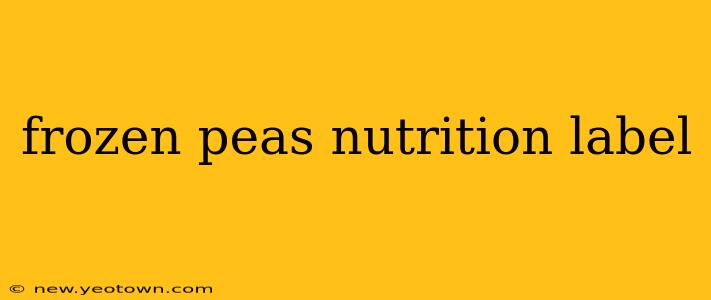Decoding the Frozen Pea Nutrition Label: A Story of Tiny Green Powerhouses
Let's be honest, frozen peas aren't exactly glamorous. They're not the vibrant, Instagrammable star of the produce section. But tucked away in those freezer bags are tiny nutritional powerhouses, packed with goodness that often gets overlooked. My grandmother, a woman who knew the value of a well-stocked freezer, always had bags of frozen peas on hand. She’d toss them into soups, stir-fries, or simply steam them as a side dish. It was her secret weapon for quick, healthy meals, and I’m here to share her wisdom (and the secrets of the nutrition label!).
What's Actually on a Frozen Pea Nutrition Label? (And Why Should You Care?)
A typical frozen pea nutrition label can seem like a jumble of numbers and percentages, but understanding it can transform your relationship with this humble vegetable. You'll find information broken down into categories:
- Serving Size: This is usually about 1 cup (100g) of frozen peas. Pay attention to this, as the rest of the values are based on this specific amount.
- Calories: Relatively low, usually around 62 calories per serving. Perfect for those watching their weight!
- Total Fat: Minimal, often under 1 gram. This is great news for heart health.
- Sodium: This varies greatly depending on the brand and whether any added salt is present. Look for brands that are low in sodium.
- Total Carbohydrate: Peas are a good source of carbohydrates, primarily in the form of starch and fiber.
- Dietary Fiber: An important element for gut health and digestion. Peas offer a decent amount.
- Total Sugars: Peas contain natural sugars, but it's usually a small amount compared to other vegetables.
- Protein: Peas offer a small amount of protein, contributing to your daily intake.
- Vitamins and Minerals: This is where the real nutritional magic happens! You'll see significant amounts of Vitamin K, Vitamin C, Vitamin A, and various minerals like iron and manganese.
What Vitamins and Minerals Are in Frozen Peas?
Frozen peas are surprisingly rich in essential vitamins and minerals. Let’s break it down:
- Vitamin K: Crucial for blood clotting and bone health.
- Vitamin C: A powerful antioxidant that boosts the immune system.
- Vitamin A: Supports vision, immune function, and cell growth.
- Iron: Essential for carrying oxygen throughout the body.
- Manganese: Plays a role in bone health, wound healing, and metabolism.
Are Frozen Peas as Nutritious as Fresh Peas?
This is a common question, and the answer is a resounding: yes, largely so! Freezing vegetables often happens very quickly after harvesting, which helps to lock in nutrients. In some cases, frozen peas might even retain more nutrients than their fresh counterparts, which can lose nutrients during transportation and prolonged storage.
How Many Calories Are in Frozen Peas?
As mentioned earlier, a typical serving (about 1 cup) of frozen peas contains roughly 62 calories. This low calorie count makes them a perfect addition to weight-management diets.
What Are the Health Benefits of Eating Frozen Peas?
The health benefits of frozen peas stem from their impressive nutrient profile:
- Improved Heart Health: The low fat and high fiber content contribute to cardiovascular well-being.
- Boosted Immunity: Vitamin C and other antioxidants strengthen the immune system.
- Enhanced Digestion: The fiber helps maintain a healthy gut.
- Stronger Bones: Vitamin K plays a vital role in bone health.
- Improved Vision: Vitamin A contributes to healthy vision.
My grandmother’s simple wisdom – keep frozen peas on hand – is a lesson in convenient, healthy eating. Next time you’re at the grocery store, don't overlook those unassuming green bags. They’re a testament to the power of readily available, nutritious food.

